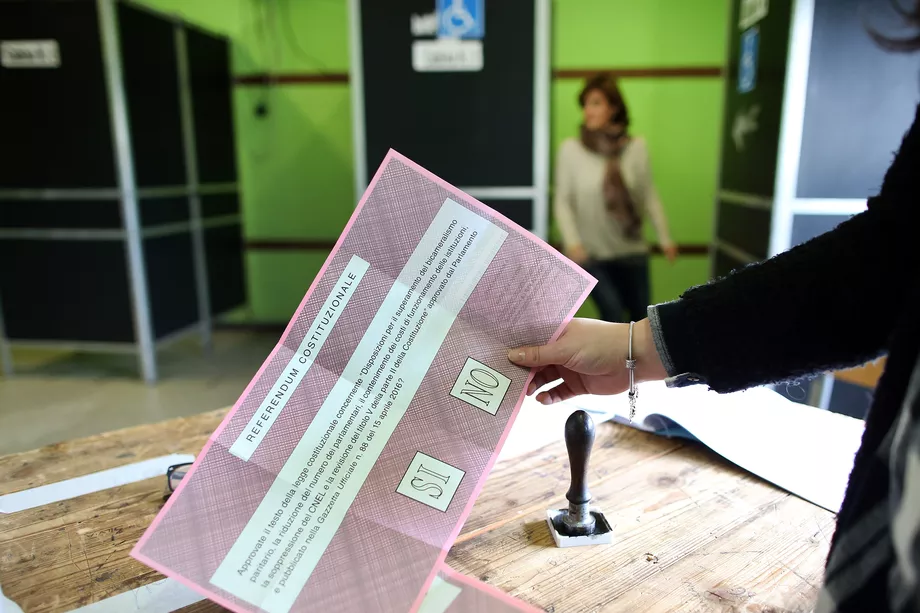
Italian Prime Minister Matteo Renzi’s much-anticipated referendum on reforming the country’s constitution failed on Sunday, an outcome that will shake up the country’s political scene, raise questions over its commitment to the euro and likely create volatility in its ailing banking sector.
By late Sunday night, the BBC reported that projections showed a healthy majority of Italians voted “no” on a package of reforms proposed by Renzi and his center-left Democratic Party to dramatically reduce the the size and power of one of Italy’s two chambers of parliament. The ballot measure was part of a broader effort to counteract the country’s tendency toward legislative paralysis, although many of Renzi’s critics derided it as a power grab.
In the immediate aftermath of the vote, Renzi said he would submit his resignation Monday, honoring a pledge to step down if the measure failed at the ballot box. His promise meant that the referendum was not just a vote on his proposed reforms, but also on whether the public wanted him in office.
Analysts say that Italian President Sergio Mattarella will likely appoint a caretaker government and that early elections could be held next year.
Renzi’s defeat is a gift to Beppe Grillo and his populist Five Star Movement, the most prominent opposition group in Italy. Grillo has called for an “Italeave” referendum — a ballot measure that would allow the country to vote on whether it should abandon the euro as its currency. For proponents of the shared European currency who fear another Brexit scenario, Grillo’s growing popular support is a reason for concern.
The other major immediate effect of the “no” vote is that it could make it harder for Italy’s massively indebted banks to raise badly needed capital, making a messy rescue operation coordinated by the government more necessary.
The vote won’t determine whether Italy keeps the euro
If the Five Star Movement does end up making it to Palazzo Chigi, the prime minister’s residence, it wouldn’t necessarily spell the end of Italy’s commitment to the euro. Italy’s constitution doesn’t allow the government to withdraw from international treaties by popular vote, so, as Bloomberg notes, it might be necessary for the constitution to be amended before a referendum on euro membership can be held. It’s theoretically even possible that two referenda would need to be held — one on changing the constitution to allow for the euro membership referendum, and one on euro membership itself. And even if all this worked out, the Constitutional Court could block it.
The Five Star Movement has grown explosively since it was founded in 2009, garnering support from people across the political spectrum for its aggressive stances on rooting out corruption in the Italian government and leaving the euro. Many Italians are attracted to Grillo’s fierce criticism of the European currency, which he has deemed an “anti-democratic straitjacket” out of concern that the EU will impose harsh austerity measures on Italy in the case of a bank bailout, in the manner it did with Greece.
With Renzi’s coming resignation, the Five Star Movement, already the second most popular party in Italy, is in a particularly good position to perform well in the next election. But there are a number of factors that could temper its rise.
The first is tied to an electoral law that went into effect this year that makes it easier for parties to snag majorities in one of the chambers of parliament. The law, nicknamed Italicum, awards a majority of the seats in the Chamber of Deputies to the party that either passes a 40 percent threshold in votes or wins a run-off between the leading two parties from the initial ballot. Recent polls indicate that it’s a system that strongly favors the Five Star Movement.
But it could effectively be overturned under the new caretaker government or by a ruling from the Constitutional Court. Since the Five Star Movement has ruled out coalitions with other parties because it would entail political compromise, a return to a system of proportional representation would make it extremely difficult for it to claim majority of seats. Of course, that stance on coalitions could change in the future.
The Five Star Movement still has its work cut out for it
The Five Star Movement is also still largely untested as a party and evolving from its origins as a protest movement. Sustained criticism of its newly-elected politicians like Virginia Raggi, the mayor of Rome, could take a toll on the party’s reputation and cast doubt on its ability to govern when actually taking power. Raggi has come under fire from across the political spectrum for her struggle to put together a city council and some striking administrative failures early in her tenure as mayor. The Five Star Movement could lose steam if other similar failures among its inexperienced politicians arise.
This referendum result is likely to cause upheaval in Italy’s political and economic life and casts its relationship with Europe in a new light. But its several steps short of a Brexit scenario for Italy.
END

Be the first to comment